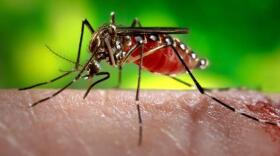
Scott Hensley
Scott Hensley edits stories about health, biomedical research and pharmaceuticals for NPR's Science desk. During the COVID-19 pandemic, he has led the desk's reporting on the development of vaccines against the coronavirus.
Hensley has worked on award-winning investigations in collaboration with journalistic partners.
He was the lead NPR editor on an investigation with the Center for Public Integrity in 2018 that exposed drug industry influence on the choices of preferred medicines by Medicaid programs. The work won the 2019 Gerald Loeb Award for audio reporting.
In 2017, Hensley was the lead NPR editor on an investigation with Kaiser Health News that showed how the pharmaceutical industry exploits government incentives intended to encourage the development of treatments for rare diseases. The stories won the 2019 digital award from the National Institute for Health Care Management.
Hensley has been editing in his current role since 2019. He joined NPR in 2009 to launch Shots, a blog that expanded to become a digital destination for NPR health coverage.
Before NPR, Hensley was a reporter and editor at The Wall Street Journal. He was the founding editor of The Wall Street Journal Health Blog, which focused on the intersection of health and business. As a reporter, he covered the drug industry and the Human Genome Project.
Hensley served on the board of the Association of Health Care Journalists from 2012 to 2020.
He has a bachelor's degree in natural sciences from Johns Hopkins University and a master's in journalism from Columbia University.
Before becoming a journalist, Hensley worked in the medical device industry. He remains, now and forever, a lover of Dobermans, lacrosse and Callinectes sapidus.
-
Many of the cost factors that people think are the most important pale in comparison to those that actually are. Mismanagement and fraud top the list. New technologies and treatments are low. Most people think beneficiaries pay their own way or have prepaid for care, neither of which is the the case.
-
When many states ease eligibility rules for Medicaid in January, the new enrollees are likely to include more men, whites and people in generally good health.
-
If you have health coverage, you're more likely to go to the doctor. And that's one reason to think that the rollout of the federal health law could help bring down death rates from cardiovascular disease.
-
About 9 million American adults have taken sleeping pills in the past month. Their popularity generally increases with age and is highest among people 80 and older.
-
Dengue fever was commonplace in Florida until the 1930s. Air conditioning, window screens and better mosquito control helped break the dengue cycle. Now the mosquito-borne illness is back.
-
An analysis allays concerns that Medicare beneficiaries may have trouble getting in to see doctors. Access has been stable and is on par, or a little better, than for people with private health insurance.
-
Back in 1979, about two-thirds of boys out West got circumcised in the hospital soon after they were born. By 2010, only 40 percent were. Nationwide, rates of circumcision have dropped about 10 percent over the past 30 years.
-
People who had taken LSD, psilocybin or mescaline at any time in their lives were no more likely than those who hadn't to wind up in mental health treatment or to have symptoms of mental illness, a Norwegian study finds.
-
Missouri medical students who spent a summer working with country doctors were more inclined to pick primary care specialties later on. Nearly half of those who tried a summer in rural practice wound up working in rural areas in their first jobs after finishing medical training.
-
The federal government is divvying up $67 million among more than 100 groups that applied for grants to help people navigate new health insurance options. Insurance health exchanges open for business in October.









